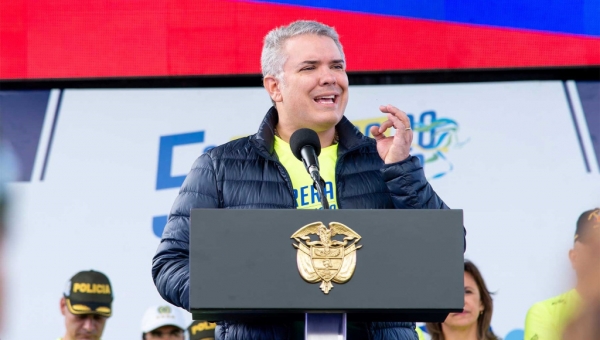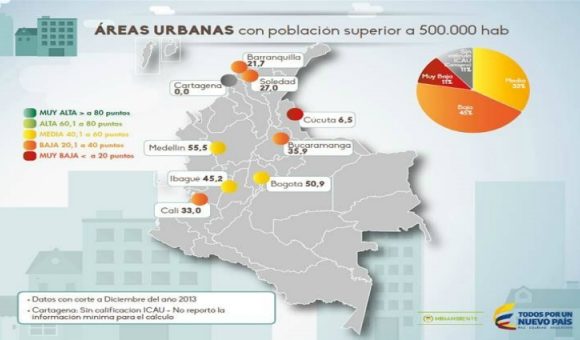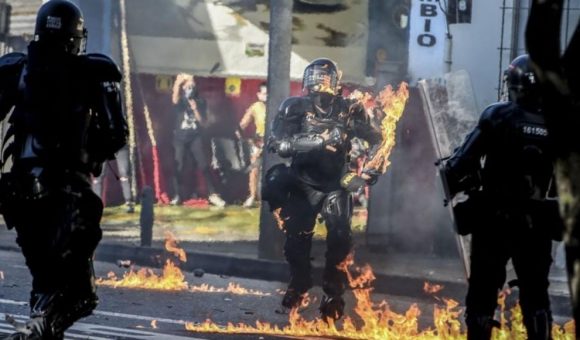Medellin Outshines Colombia With Peaceful Protest & Civility, in Contrast to Vandalism in Bogota, Cali

In contrast to rock-throwing against police and vandalism to buildings and infrastructure in Bogota and Cali — following otherwise peaceful, well-organized November 21 nationwide protest marches — Medellin once again demonstrated to all Colombia that peaceful protest in a democracy effectively advances civil reform.
Immediately taking note of that was Colombia President Iván Duque Márquez, who publicly hailed marchers in Medellin and elsewhere for avoiding the mindless vandalism that broke out at the conclusion of otherwise peaceful marches.
Duque praised the peaceful protesters — and promised multi-party negotiations to work out upcoming, potential reforms to pensions, employment-stimulation programs and other demands raised by marchers.
In contrast to the counter-productive vandalism in Bogota, some participants in the peaceful protest march in Medellin actually surrounded and stopped “encapuchados” (hooded vandals) from attacking buildings along the march route, as noted by both President Duque and Medellin Mayor Federico Gutierrez (see video here: https://twitter.com/i/status/1197615386520363019).
“What is better [anti-crime] control than that by citizens?” Gutierrez noted in a post-march tweet. “Congratulations and thanks to those who prevented vandalism. What great behavior! How proud we are for Medellin!”
In a nationwide address following the marches, President Duque stated: “Colombians spoke today. I will not get tired of saying it: we are a government that listens and builds.
“We understand that peaceful protest is legitimate in a democracy. And that throughout history there have been frustrations that we must resolve and that we have been attending.
“Today, despite the acts of violence, attributable to vandals that do not represent the spirit of Colombians, we show that this country can exercise individual freedoms without violating the freedoms of others.
“That is why I want to highlight the attitude of the citizens who rejected the vandals and made it clear that to express onself, one does not need to resort to violence.”
Just prior to the protest marches, Colombia’s Labor Minister Alicia Arango stated in a televised panel discussion that in contrast to false claims made by several organizers of the protest marches, “this government has never thought of lowering the minimum wage and even less so for young people.”
“There is not a single [government proposal] written on labor and pension reforms, and this is because if this possibility is analyzed, then it must go through the Labor Agreement Board,” which includes labor unions, employer organizations and government regulators, she added.
In contrast to fake news being spread by left-wing propagandists, Arango pointed out that the Duque administration is actually increasing subsidy payments to the poorest retirees in Colombia – a program created by the current administration since January 1, 2019.
As for creating more first-time job opportunities for young people, Arango pointed out that the Duque administration’s National Development Plan now allots 10% preference for new public-sector jobs for young people between 18 and 28 years old.
In addition, the Colombia minimum wage was boosted by 6% this year — the largest hike in 25 years — while the transport subsidy rose 10% for lower-income workers, the biggest increase in 14 years.
As for the state-run Colpensions pension fund (roughly similar to the U.S. Social Security system), in contrast to fake news claims, “Colpensiones will not be eliminated,” Arango said.
“On the contrary, it will be strengthened and become the central axis of economic protection for old age” added Colpensiones president Juan Miguel Villa, who participated with Arango in the public presentation.
















